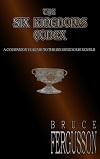Ancient Greece has often been called the cradle of democracy. Sure, most of the people living in its city-states were not allowed to be citizens, and women couldn’t vote or own property (at least Sparta got the latter right). Still, they had a pretty good thing going, considering the alternatives elsewhere at the time. According to the historian James Davidson, “Athens was not only a model democracy, in many ways it was also a paradigm of the minimalist state vaunted by today’s extreme libertarians.”
But there’s one aspect of the Greek model—we’ll specify the Athenians—that’s been generally overlooked: the use of a lottery in much of their political processes. They had an Assembly, in which all citizens were eligible to participate, but they used a lottery to select citizens to participate in a smaller Council of 500, which ran day-to-day business. And they used lottery selection for jury-panels and other committees and magistrates. The Athenians were obsessed about keeping money and influence out of the system as much as possible. They even constructed lottery machines (kleroterias) to ensure fairness of selection. Davidson again: “The lottery-machines were a kind of bulwark against the constant threat of anti-democratic forces…”
So with our election only weeks away and its cost expected to rise, before it’s over, to a billion dollars, here’s a modest ‘back to the future’ idea.
First of all, what say we require a mandatory $5 contribution from each tax-payer, toward a pool of money used to finance Congressional races for the Senate and House of Representatives? Ask not what your country can do for you, ask what you can do for your country? Well, the cost of a grande mocha or a jumbo bag of potato chips doesn’t seem too much to ask to help take money out of politics. One party’s stupendous sums of money is, of course, touted as the other’s means for corruption, and that’s the problem: it’s a political arms race.
Next, we pick the president by lottery. If the Greeks could devise a machine for this, I’m sure we can do the same.
Here’s how it might work.
Congressional leaders of both parties (in addition to a lottery-selection of others) would select five presidential candidates each, for a total of ten possible winners, from the Senate and House—so five from each party–the only stipulation being that each had served at least one term. Also, state governors could be selected as choices for the ten, again with the same proviso that they had served as least one full term as governor. Needless to say, the philosophies and beliefs of those selected would reflect those of each political party in general. Someone who’d gone on record espousing annexation of Mexico or war with China wouldn’t make the cut. The danger of one party ‘stacking the deck’ with their five choices is minimized by the lottery selection of the committee itself. See?
All ten potential winners would be vetted by the lottery committee, followed by a national ‘getting-to-know-you’ period of perhaps three months. Appearances on “Dancing With the Stars” would be strictly optional but ’60 Minutes’ might be helpful.
Then the Presidential Lottery, the super Power-ball of lotteries—without the money.
The winner would serve a single term of, say, seven years. He or she would be allowed to pick the vice-president but again the same stipulations would be required.
With this method we could hardly do worse than we have in the past. Yes, we got Lincoln and Roosevelt; we also got Coolidge, Hoover and Hayes, McKinley and Taft–and the guy who got us into this mess of the last four years (his last name begins with a “B”, not his first). And I’d be willing to take my chances of having a lottery choose a secretive and smarmy vulture capitalist who put his dog in a cage and strapped it on the roof of his car enroute to the family vacation.
That billion dollars will certainly keep rising for the next election. Oh, you say, the crucible of a presidential campaign vets the candidate, giving us the best qualified? That’s debatable but even it did to a degree, is it worth a billion dollars?
No direct participation by the people with their vote? Well, half of us don’t vote anyway. And a presidential lottery might force us to pay a LOT closer attention to the senators, representatives and governors for whom we DO vote.
Getting the money out of it is the crucial thing. Our elections are increasingly being bought by those with the bigger bucks, our candidates essentially being picked for us by the very wealthy. The Greeks gave us a word for that, too: oligarchy.
In the meantime, the choice this November seems clear enough to me, and it’s NOT Mr. 47% who represents a political party which has perfected the use of the Big Lie, where up is down, black is white, falsehood is truth and strength is weakness; which believes only they have a fundamental right to power, and is attempting to suppress the voting rights of as many American citizens as they can in order to get it before the demographic pendulum swings forever away from them.


